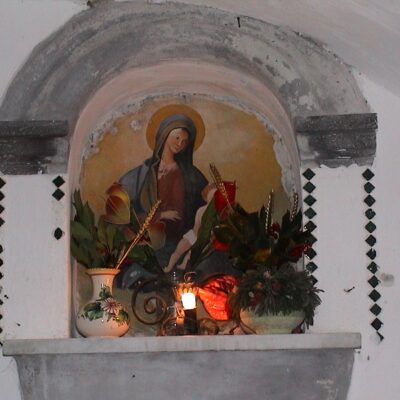The “minor” heritage: votive aedicules, limestone, “revote”, pergolas

This interpretation of the territory introduces a path that is a continuous discovery mostly entrusted to the curiosity of the visitor himself.
In fact, the votive aedicules are widespread in all the municipalities, especially those on the coast, and if on the one hand they represent a testimony of the religious sentiment of the inhabitants of the Amalfi Coast, on the other they are, in some cases, real artistic masterpieces. .
In these small niches, the devotees had the image of the Virgin or Saint to whom they wanted to entrust painted directly on the wall or on specially prepared majolica tiles, also placing their name and often the reason for the offer in the lower part.
These newsstands were looked after by the devotee who had them built or by the inhabitants of the entire neighborhood or district where they were with candles and flowers.
This particular care also offers another explanation, in addition to religious sentiment, for the construction of so many aedicules especially on street corners: at a time when public lighting did not exist, the candles that lit up the niche also served to illuminate the street.
Among the most widespread reproductions is that of the Madonna, Christ rarely appears (there are two interesting Calvaries, one in Atrani and one in Ravello, made of wood, where, especially in the Atranese one, we rediscover in the elongated figures characters of artistic inspiration from the northern Europe), many saints, among the most revered on the coast.
The door to the path in Praiano allows you to recognize in each votive aedicule not only the artistic taste that influenced the painter but also the richness of subjects that can be found in many of the streets of the municipality.
Newsstands are usually found on the walls of the maze of narrow streets of these municipalities: it is therefore necessary to reach the municipalities and then move on foot.

